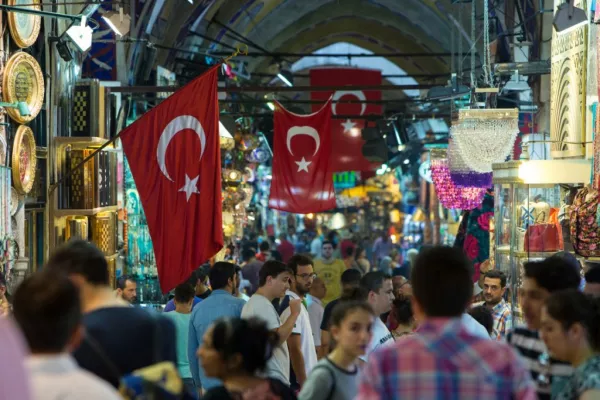A vacation at a sun-baked Turkish resort is a hard sell this year. So is family dinner at a once-bustling cafe.
Tensions with Russia and a succession of deadly bombings blamed on Islamic State and Kurdish militants are scaring away visitors from the world’s sixth-most popular holiday destination. Shuttered hotels and canceled flights are eating into the foreign currency inflows the economy needs to keep its current-account gap under control. Tourism revenue may fall below $20 billion this year for the first time since 2008, according to political risk consultants Eurasia Group.
US-based Delta Airlines Inc. suspended service from New York to Istanbul that was to have begun next month, and Spain’s Iberia temporarily canceled four weekly flights from Madrid. The violence, which has killed more than 200 people since July, is also deterring locals from frequenting once-popular gathering places, hushing the thrum of the country’s busiest streets.
“I can’t help noticing people’s bags, it makes me uncomfortable,” said Murat Kurtulus, a 32-year-old worker at a telecommunications company. “Before the bombings, I used to spend my weekends at shopping malls and movie theaters. Now I prefer to go to parks and avoid crowds.”
Seaside Resorts
Tourism accounts for 6.2 percent of Turkey’s economic output, according to the Association of Turkish Travel Agencies, and 8 percent of employment. This year, hundreds of resorts on Turkey’s Mediterranean and Aegean coasts have scrapped plans to hire thousands of seasonal workers, industry officials said.
Others may not even reopen for the season. Foreign arrivals sank 8.5 percent in January-February -- the largest on-year drop in at least a decade, according to tourism ministry figures. Salim Tasci, a real-estate agent in Ankara, says he’s handling dozens of hotel sales offered at discount prices. “I have never seen such a dramatic increase,” said Tasci, an agent for 40 years.
After annual peaks of nearly $30 billion in revenue, “Turkey would be lucky to get $20 billion this year,” said Naz Masraff, director for Europe at Eurasia Group. “This is a significant blow to the country’s foreign exchange revenues.”
Rekindled Fighting
Militant attacks and political turmoil have clobbered economies in an array of countries in the Middle East, including Egypt and Tunisia. Security concerns in Turkey have arisen from a resurgence in the decades-old war with Kurdish groups after a pro-Kurdish party briefly stripped the ruling AKP of its parliamentary majority and spillover from Syria’s civil war.
Given that Turkey receives about 40 percent of its tourism revenue between July and September, an escalation in attacks could “have a much more significant impact on tourism revenues and hence the current-account deficit,” said Yarkin Cebeci, an economist at JPMorgan Chase & Co. in Istanbul.
The Turkish economy, however, will face the potential crisis from a position of strength.
The plunge in global commodity prices has helped narrow the current-account shortfall to 4.46 percent of economic output at the end of 2015, the lowest since 2010. Gross domestic product, fueled by consumer demand, expanded 5.7 percent in the last three months of 2015, exceeding estimates.
Government Efforts
The government is also trying to minimize the financial fallout, letting banks twice restructure as much as $17 billion in loans to tourism businesses before declaring them non-performing. It’s also offered to pay salaries of 45,000 tourism workers for three months.
That might not be enough.
For hotels, the outlook is “quite bleak,” said Cetin Osman Budak, a lawmaker from the opposition Republican People’s Party and former head of the Chamber of Commerce in Turkey’s most popular resort city, Antalya on the Mediterranean.
“Many hotels did not open this year in the resort town of Kemer near Antalya, there is a 40 percent drop in reservations from Europe based on early bookings,” Budak said. “Even big companies are keeping half of their hotel-chains closed because hotel managers are finding it harder to pay back loans.”
Visitor numbers have fallen off especially sharply from Germany and Russia.
News by Bloomberg, edited by Hospitality Ireland









